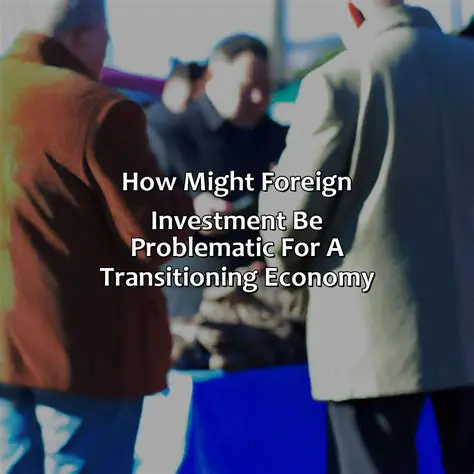Introduction:
As economies transition and develop, foreign investment is often seen as a potential catalyst for growth and prosperity. However, the influx of foreign capital can also bring about a host of challenges and drawbacks that may hinder the sustainable development of a transitioning economy. In this blog post, we will delve into the potential problematic implications of foreign investment in a transitioning economy. From the dependency on foreign capital for development to the erosion of domestic industries, we will explore how reliance on external financial resources can lead to inequality, wealth distribution issues, and a loss of economic sovereignty. Additionally, we will discuss how vulnerability to global economic fluctuations can further exacerbate the challenges posed by foreign investment. By examining these key subheadings, we aim to shed light on the complexities involved in navigating foreign investment in a transitioning economy and the need for a balanced and strategic approach towards economic development.
Dependency on foreign capital for development
Many developing countries rely heavily on foreign capital to fuel their economic growth and infrastructure development. This dependency can be a double-edged sword, as it can provide much-needed funding for projects and initiatives, but it also puts these nations at the mercy of global financial markets and foreign investors. When these countries are unable to attract or maintain foreign capital, their development projects can grind to a halt, leading to unemployment and poverty as a result.
Moreover, the conditions attached to foreign loans and investments can be onerous, forcing developing countries to make potentially detrimental policy decisions in order to secure funding. This can lead to a loss of economic sovereignty and perpetuate a cycle of dependency on external sources of capital. Furthermore, the interest payments and other obligations related to foreign capital can drain the resources of developing countries, exacerbating inequality and hindering inclusive development.
In order to mitigate this dependency, it is essential for developing countries to focus on building their domestic capital base and financial infrastructure. By fostering a robust and stable domestic economy, these countries can reduce their reliance on foreign capital and retain greater control over their economic and developmental agendas. Additionally, fostering partnerships with other developing countries and exploring alternative sources of financing, such as multilateral development banks and domestic investors, can help reduce the vulnerability to global economic fluctuations and market volatility that comes with dependency on foreign capital.
Ultimately, the goal should be for developing countries to achieve a more balanced and sustainable development model that minimizes their reliance on foreign capital and enhances their economic sovereignty. By doing so, these nations can chart a more independent and resilient path toward progress and prosperity for their citizens.
Inequality and wealth distribution
There is an alarming trend in the world today, where the inequality in wealth distribution is reaching unprecedented levels. The gap between the rich and the poor continues to widen, with the top 1% holding a disproportionate amount of global wealth. This disparity is not only unjust, but it also has far-reaching consequences for the overall well-being of society.
One of the primary concerns with this growing inequality is its impact on social cohesion. As the rich become richer and the poor become poorer, it creates a sense of resentment and distrust among different segments of society. This can lead to social unrest and a breakdown of community solidarity, ultimately undermining the stability of a nation.
Furthermore, the concentration of wealth in the hands of a few individuals and corporations can hinder economic growth. When a small portion of the population controls the majority of resources, it limits the opportunities for others to thrive and contribute to the economy. This creates a vicious cycle of poverty and lack of upward mobility, further perpetuating the inequality in wealth distribution.
In order to address this issue, it is essential for governments and policymakers to implement measures that promote a more equitable distribution of wealth. This may include progressive taxation, investment in education and healthcare, and the enforcement of fair labor practices. By taking proactive steps to reduce inequality, we can create a more just and sustainable society for all.
Erosion of domestic industries
One of the major concerns facing many countries today is the erosion of domestic industries. With the rise of globalization and free trade agreements, many local businesses have struggled to compete with larger multinational corporations. This erosion has led to job losses, economic instability, and a decline in the overall strength of the domestic economy.
Furthermore, the shift of production to countries with lower labor costs has only accelerated the erosion of domestic industries. As a result, many skilled workers have been left unemployed, leading to social and economic hardships for local communities.
The erosion of domestic industries has also resulted in a loss of innovation and technological advancements in many countries. As multinational corporations dominate the market, smaller local businesses have less resources to invest in research and development, leading to a stagnation in the overall progress of the domestic economy.
It is clear that the erosion of domestic industries has far-reaching implications for the economic well-being of a country. Therefore, it is crucial for policymakers to prioritize strategies that support and protect local businesses in order to ensure the long-term sustainability of the domestic economy.
Loss of economic sovereignty
Loss of economic sovereignty occurs when a country becomes heavily reliant on foreign capital for its economic growth and development. This dependence can take many forms, such as receiving loans and investments from foreign governments, multinational corporations, or international financial institutions. While these inflows of capital can provide temporary relief and support, they come with significant strings attached, often subjecting the recipient country to the economic and political agendas of the providers.
Furthermore, the loss of economic sovereignty can also manifest through the influence of foreign companies and industries on the domestic economy. When a country’s domestic industries become eroded by competition from foreign businesses, the nation’s ability to control its own economic fate diminishes. This can lead to a situation where key economic decisions, such as resource allocation and trade policies, are steered by external forces rather than being determined by the needs and priorities of the domestic population.
In addition to the erosion of domestic industries, the loss of economic sovereignty is also intertwined with issues of inequality and wealth distribution. Foreign capital inflows often exacerbate existing disparities within a country, further concentrating economic power and resources in the hands of a few. This concentration of wealth can then allow external actors to exert even greater influence over the nation’s economic policies and decision-making processes.
Ultimately, the loss of economic sovereignty renders a country highly vulnerable to global economic fluctuations and crises. Without the ability to independently manage and regulate its own economic affairs, a country becomes subject to the whims and volatilities of the global market, which can have devastating effects on the well-being and stability of its citizens. Therefore, safeguarding economic sovereignty is crucial for ensuring a nation’s long-term prosperity and autonomy.
Vulnerability to global economic fluctuations
Global economic fluctuations have a significant impact on the economic stability of countries around the world. The vulnerability of a country’s economy to these fluctuations can lead to severe consequences for its citizens, businesses, and overall financial well-being.
When a country is heavily reliant on foreign investment and loans, it becomes highly susceptible to global economic fluctuations. Any negative changes in the global economy, such as a recession or financial crisis, can quickly spread to the vulnerable country, leading to a decline in trade, investment, and economic growth.
In addition, the interconnectedness of the global economy means that a downturn in one major economy can have a domino effect on other countries. This can further exacerbate the vulnerability of certain nations to global economic fluctuations, as they struggle to cope with the ripple effects of a downturn in a major economic power.
Furthermore, countries with a heavy reliance on exports are particularly vulnerable to global economic fluctuations. A decrease in demand for their exports due to a global economic downturn can lead to a sharp decline in their economic growth and stability, as they struggle to find alternative markets for their goods and services.
Frequently Asked Questions
What are the potential problems of foreign investment for a transitioning economy?
Foreign investment can lead to dependency on outside capital for development, inequality in wealth distribution, erosion of domestic industries, loss of economic sovereignty, and vulnerability to global economic fluctuations.
How does foreign investment contribute to dependency on outside capital for development?
Foreign investment can create a situation where the transitioning economy becomes reliant on outside capital for funding its development projects and initiatives.
What is the impact of foreign investment on inequality and wealth distribution in a transitioning economy?
Foreign investment can exacerbate inequality in wealth distribution, as the benefits of the investment may not be equally shared among the population.
How does foreign investment lead to the erosion of domestic industries in a transitioning economy?
Foreign investment can result in the dominance of foreign companies, leading to the decline of domestic industries and the loss of jobs for local workers.
In what way does foreign investment contribute to the loss of economic sovereignty for a transitioning economy?
Foreign investment may give foreign entities significant control over key sectors of the transitioning economy, reducing its ability to make independent economic decisions.
How does foreign investment make a transitioning economy vulnerable to global economic fluctuations?
Foreign investment ties the transitioning economy to the global market, making it susceptible to economic downturns and fluctuations in the global economy.
What are some potential solutions to the problems associated with foreign investment in a transitioning economy?
Measures such as careful regulation, investment in domestic industries, and diversification of the economy can help mitigate the negative effects of foreign investment.







